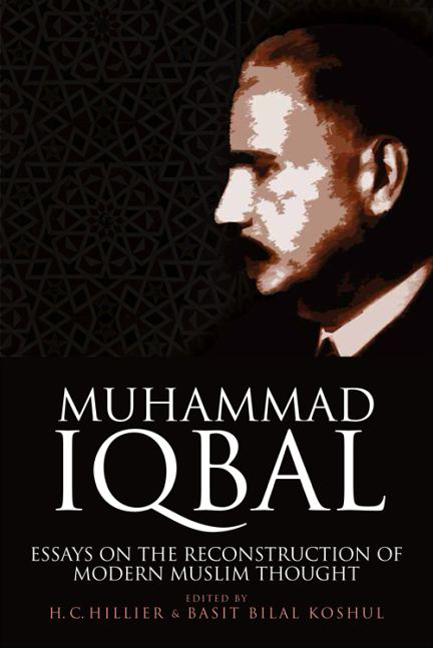Book contents
- Frontmatter
- Contents
- Preface
- 1 Introduction
- 2 The Human Person in Iqbal's Thought
- 3 Achieving Humanity: Convergence between Henri Bergson and Muhammad Iqbal
- 4 The Contemporary Relevance of Muhammad Iqbal
- 5 Pragmatism and Islam in Peirce and Iqbal: The Metaphysics of Emergent Mind
- 6 Between Hegel and Rumi: Iqbal's Contrapuntal Encounters with the Islamic Philosophical Traditions
- 7 Reconstructing Islam in a Post-metaphysical Age: Muhammad Iqbal's Interpretation of Immortality
- 8 Iqbal, Bergson and the Reconstruction of the Divine Nexus in Political Thought
- 9 Muhammad Iqbal: Restoring Muslim Dignity through Poetry, Philosophy and Religious Political Action
- Index
4 - The Contemporary Relevance of Muhammad Iqbal
Published online by Cambridge University Press: 10 October 2017
- Frontmatter
- Contents
- Preface
- 1 Introduction
- 2 The Human Person in Iqbal's Thought
- 3 Achieving Humanity: Convergence between Henri Bergson and Muhammad Iqbal
- 4 The Contemporary Relevance of Muhammad Iqbal
- 5 Pragmatism and Islam in Peirce and Iqbal: The Metaphysics of Emergent Mind
- 6 Between Hegel and Rumi: Iqbal's Contrapuntal Encounters with the Islamic Philosophical Traditions
- 7 Reconstructing Islam in a Post-metaphysical Age: Muhammad Iqbal's Interpretation of Immortality
- 8 Iqbal, Bergson and the Reconstruction of the Divine Nexus in Political Thought
- 9 Muhammad Iqbal: Restoring Muslim Dignity through Poetry, Philosophy and Religious Political Action
- Index
Summary
Charles Taylor argues:
We must reread Iqbal. For a time we could imagine him forgotten, consigned to the oubliettes with the other figures of Islamic modernism from the beginning of this century. But he had to come back. (Taylor 2010: xi)
The reason that Iqbal ‘had to come back’ is because he speaks to us today. Taylor notes that while Iqbal could be read for different reasons ‘we also have shared reasons, Western, Muslim and Eastern merged together, in reading this remarkable man’ (Taylor 2010: xi). These shared reasons are the result of the modern cultural condition that is characterised by ‘a deep and mutual mistrust’ of the alien other. The source of this mistrust is the way in which the modern self constructs its identity:
This distrust is partly derived from our own uncertainty regarding our identity, which sometimes gives us a feeling of insecurity under the gaze of others. It's this feeling that can lead to a sort of hyper-confidence, tightening around a rigid identity, and the belligerent rejection of the other as the bearer of evil. (Taylor 2010: xi)
In constructing its identity, the modern self requires that the alien other be neglected/rejected, marginalised, and eventually demonised. Taylor argues that we need a radical change in perspective in light of the fact that in the contemporary cultural condition we constantly come face to face with the alien other. We need a way/method of constructing our identity that makes it possible for us to ‘seek out and define oneself using references found in the other's tradition’ (Taylor 2010: xi). In this way, instead of the ‘gaze of others’ being a cause of fear, suspicion, and xenophobia, it becomes a resource of self-discovery, self-awareness, and self-affirmation. Given the dominant orthodoxies in philosophy, religion, and science this appears to be logically, theologically, and sociologically impossible. Taylor argues that Iqbal's thought opens up possibilities that the dominant orthodoxies close down:
In this atmosphere of suspicion and anger, it is a joy to hear the voice of Iqbal, both passionate and serene. It is the voice of a soul that is deeply anchored in the Qur'anic Revelation, and precisely for that reason, open to all the other voices, seeking in them the path of his own fidelity. (Taylor 2010: xii)
- Type
- Chapter
- Information
- Muhammad IqbalEssays on the Reconstruction of Modern Muslim Thought, pp. 56 - 87Publisher: Edinburgh University PressPrint publication year: 2015



